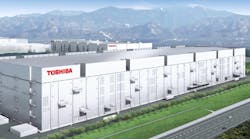Even while it takes bids on its semiconductor business, Toshiba is trying to fill surging orders for memory chips that save data in servers and smartphones. Now it is laying out plans to boost its manufacturing output.
Last week, Toshiba announced that it would build its next memory fab in the Japanese city of Kitanami. The company has prepared a building site and intends to purchase additional land and coordinate with local government officials on the project. It plans to start construction next year.
For now, Toshiba is still navigating the auction for its memory chip business, which has taken regular twists and turns over the last month. The company is selling to fill massive losses from its American nuclear power unit. Toshiba says it is still negotiating with three bidders, including groups led by Foxconn and Western Digital.
The Yitanami plant would supplement Toshiba’s newest Yokkaichi fab, which is still under construction despite the swirl of controversy around it. The company is building it with Western Digital, which has ruffled Toshiba in recent months by claiming final word on its sale. Western Digital says it has that right because it shares ownership of the Yokkaichi fab.
The Yokkaichi fab has been at the center of the recent controversy as well as flurries of litigation. After months of trading legal paper cuts, Toshiba said last month that it would install chip-making equipment in the Yokkaichi plant alone, in effect cutting out Western Digital.
Western Digital said it would not stand for Toshiba making the $1.75 billion investment into NAND flash manufacturing tools. In contrast, Toshiba – the world’s second largest memory chipmaker behind Samsung – plans to discuss the Kitanami project with its American partner before construction begins.
“The precise construction schedule and equipment investment will be made based on a variety of factors, including market trends. [Toshiba] is separately discussing with SanDisk regarding its involvement at the Kitakami site,” the company said in a statement.
Toshiba cannot afford to waste time. The market for memory chips is grappling with supply shortages, causing prices for commodity chips to skyrocket. The average selling prices of NAND and DRAM increased 5% and 19% in the first quarter this year, respectively, according to IC Insights.
That is another reason why Toshiba’s business is so coveted. The auction seemed almost over last month when Western Digital, American private equity firm Kohlberg Kravis Roberts, and two government funds offered $17.4 billion. But Toshiba’s board could not agree to the deal before an internal deadline, throwing the auction into uncertainty again.
In recent weeks, Western Digital seems to have fallen out of favor with Toshiba. Now it seems like Bain Capital is at the head of the negotiating table after Reuters reported last week that it had raised its bid to $22.3 billion. Bain’s group includes SK Hynix and the two funds that had signed onto Western Digital’s proposal. Apple is also rumored to be involved.
